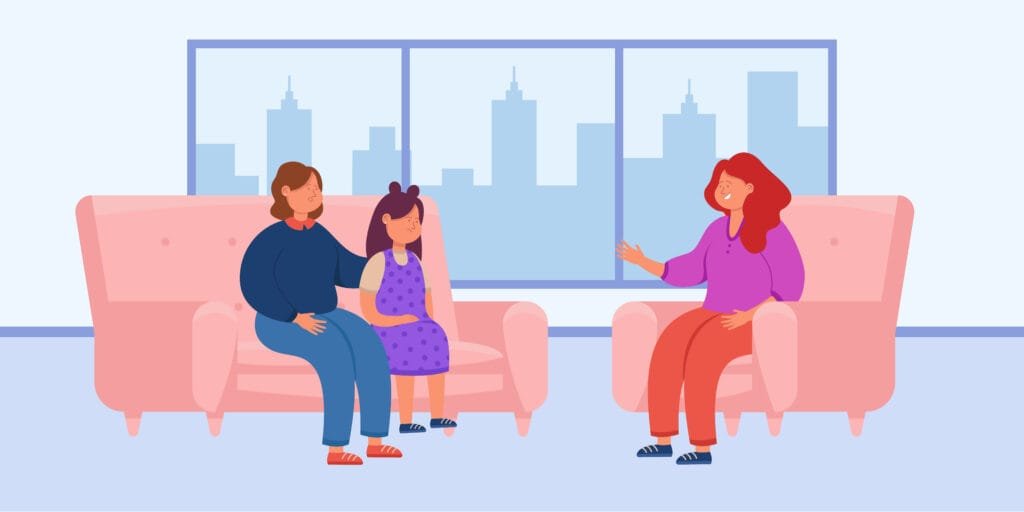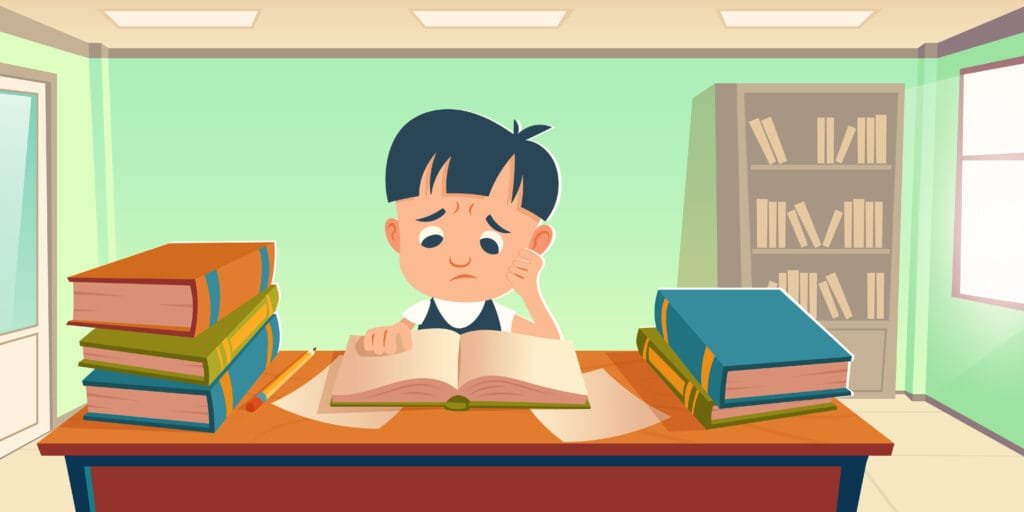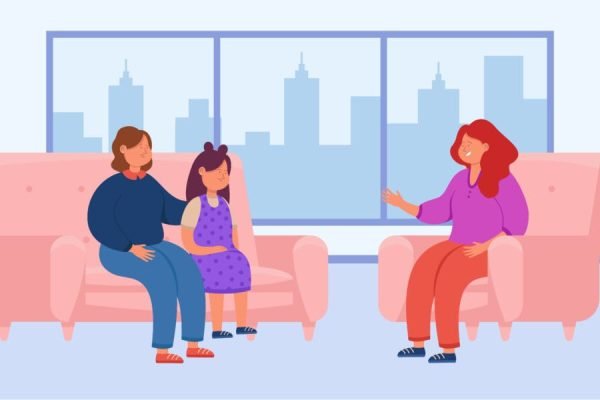This article describes about how a child psychologist can help a child and the issues they face during each developmental stage. Below article also tells about the role of a child psychologist.
A child psychologist is a mental health professional who uses psychological evaluations and various forms of therapy to help children as well as adolescents learn to better cope with life and relationship issues and mental health conditions. Child psychologists can help to treat mental, social, emotional and behavioural health conditions. Moreover a child psychologist have professional training and also clinical skills to evaluate the behavioural and mental conditions that affect children. In addition to these a child psychologist have a thorough understanding of the psychological needs of children.
A child psychologist conducts various tests to diagonise mental health and learning issues such as ADHD, Autism spectrum disorder and learning differences.
Role and responsibilities of a child psychologist

The foremost job of a child psychologist is to evaluate the difficulties that a child is facing and further providing a treatment plan. Child psychologists are experts in helping children to manage depression, developmental challenges and mental illness. Apart from working with children, a child psychologists job include educational guidance and support for families. Child psychologist work with parents individually and in groups to teach proactive behavioural prevention strategies
When can a child psychologist help?
A child psychologist can help you in the below following situations
- Temper tantrums
- Child abuse which includes physical, sexual, emotional or even neglect from dear and near ones
- Developmental and learning differences including ADHD (Attention deficit hyperactivity disorder), dyslexia ,autism spectrum disorder, communication delay and intellectual disability.
- Eating disorders which includes anorexia ,bulimia and binge eating disorder.
- Living with an illness or coping with a new diagnosis.
- Mental health conditions which includes anxiety, depression, different types of phobias, obssesive -compulsive disorder(OCD) etc
- Sleep disorders
- Going through family issues
- Stress related issues
- Disruptive behaviour disorders which include conduct disorder and oppositional defiant disorder.
Issues faced during child development
There are seven common issues in the child development and are as follows
Receptive language disorder
Receptive language disorder is the first type of speech development issue that a child exhibits during the developmental stage. This is a condition in which the child is not able to identify the shape, colours and other body parts as they don’t understand the concept and moreover if we teach the terms and concepts, they will be able to notice them but after some point of time they will loose the connection.
Expressive language disorder
The second type of speech development issue is expressive language disorder wherein a child is unable to express the emotions, feelings or other matters in words appropriate to their age. It is essential to work with these children and a child psychologist to ensure that they can piece together larger or compound words.
Speech production
Final developmental delay issue when it comes to speech is the speech production. This is a condition in which the child is unable to generate words because of the physiological structure for example if they have a weak jaw or tongue the kid may not be able to talk properly. This condition require proper assessment from a child psychologist to make sure that they are able to speak as needed.
Cognitive delay
It is the inability of a child to understand the learned concepts. In some case , child lack the intellectual awareness to piece information together. Sometimes this delay happens if there is a history of Down Syndrome, meningitis or shaken body syndrome. In this phase, it is always better to set a plan beforehand, so that the child can develop at his or her own pace as they grow.
Gross motor delay
This is one of the most widely seen issues in the child development stage. This is a condition in which a child is unable to coordinate his/her large or small muscles. Parents usually notice this stage when their child is unable to hold something in their hands or not able to walk quickly when compared to other children of their age. Even picking up a thing from the floor, holding a pen or pencil etc will be a stressful job from them as their brain doesnot make the connection.
Fine motor delay
This is condition in which the child is unable to do simple daily activities such as combing hair, brushing teeth etc. As the child gets older, this condition will become a real concern.
Emotional or behavioural delays
An autistic child may display behavioural delay. They are unable to gain an understanding of some of the emotions around them when compared to the children of their same age. Some children will even show temper tantrums because of the inefficiency to recognize what is happening around them. As they become older, these tantrums will get worse.
Developmental milestones for babies and children
Milestones are behavioural or physical checkpoints in the growth of a child’s development.
- Motor milestones- Motor milestones track baby’s gross motor skills and fine motor skills. Gross motor skills involves the movements of large body muscles( core and upper body) such as crawling, walking, sitting, running, jumping etc. Fine motor skills involves the movement of small muscles (hand and feet). Fine motor skills play a major role in performing daily activities such as writing, colouring, drawing, tying shoelaces and other activities.
- Sensory milestones – Sensory milestone tracks the development of baby’s seven senses.
- Communication milestones – Communication milestones are the building blocks to communication and social skills.
- Feeding milestones – Feeding milestones helps to track when babies start new phase of feeding.

Remember every child is unique. Milestones mark a set of functional skills or age related tasks a child should perform appropriate to their age. If your child is missing any milestone or if they face any difficulty in achieving a milestone, make sure to talk to a child psychologist at the earliest.
More often young children are naughty, adventurous, and rebellious at some point of time. Some other children have extremely stubborn and challenging behaviour that are outside the norm of their normal age. The stereotypical disruptive behaviour disorders include oppositional defiant disorder (ODD), conduct disorder (CD) and attention deficit hyperactivity disorder (ADHD). These three disorders share some common set of symptoms, so it is advisable to seek the help of a child psychologist inorder to identify the real cause.
Types of disruptive behaviour disorders
Oppositional defiant disorder
This condition may exhibit the following symptoms
- refuses to obey rules
- frequent temper tantrums
- easily irritated, annoyed or angered without a specific reason
- argues frequently with adults especially with dear and near ones
- low self-esteem
- blame others for any misfortune
Conduct disorder
Conduct disorder problem may show the below listed symptoms
- tendency to use drugs including cigarettes and alcohol at a very young age.
- lack of empathy
- a tendency to run away from home
- suicidal tendencies
- keenness to start physical fights
- using weapons
- criminal behaviour such as deliberately lighting fires, breaking into houses in order to make harm.
- showing sadistic behaviour which may include physical or sexual abuse, bullying etc
- being aggressive
Attention deficit hyperactivity disorder(ADHD)
ADHD is one of the most common disorders found in children. It is mainly diagonised in childhood but often lasts into adulthood. ADHD exhibits the below mentioned symptoms
- Inattention
- Impulsivity
- Overactivity
A child who has delinquent behaviours of conduct disorder may also have ADHA, anxiety, depression etc. If left untreated these behavioural disorder may grow up to be dysfunctional adults. Earlier intervention is better inorder to get a better outcome.
How a child psychologist can help?
Treatment is carried out by child psychologists and it is usually multi-faceted which may include,
- Family therapy
- Cognitive behavioural therapy
- Anger management
- Encouragement
- Support for associated problems
- Parental education
- Social training
Child psychology deals with the mind and behaviour of children from prenatal stage to adolescence. Child psychology deals not only with how children develop physically but also how they grow up mentally, emotionally and socially. Apart from dealing with routine cases, child psychologist also deals with children who are abused. Child psychologists work for schools, agencies or private practices to provide counseling for children. While working with children , a child psychologist should need some special qualities to endorse trust and healing in children. A child psychologist must be proficient enough at addressing many issues in children including abuse, learning disabilities, mental trauma and psychological disorders.

